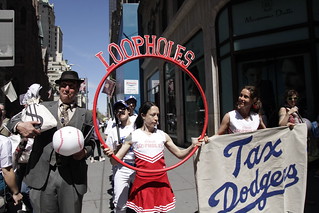Yesterday, Eric Cantor, the Republican House Majority Leader, announced that those taxpayers who pay federal payroll taxes and other types of taxes, but who don’t have enough income to owe federal personal income taxes, should be required to pay the federal personal income tax as well. Cantor made his remarks at an event (subscription required) hosted by Bank of America.
“We also know that over 45 percent of the people in this country don’t pay income taxes at all,” Cantor said, “and we have to question whether that’s fair. And should we broaden the base in a way that we can lower the rates for everybody that pays taxes… Should they even have a dollar in the game on income taxes, which is the notion of broadening the base.”
When asked if this would mean “a tax increase on the 45 percent who right now pay no federal income tax,” Cantor said, “I’m saying that, just in a macro way of looking at it, you’ve got to discuss that issue.”
CTJ’s figures show that Americans in every income group do, in fact, pay taxes and that the tax system as a whole (including all the types of taxes that Americans pay) is just barely progressive.

For example, in 2011 the richest one percent of Americans paid 21.6 percent of the total (federal, state and local) taxes but also received 21 percent of the total income in the U.S. that year. Similarly, the poorest fifth of Americans paid just 2.1 percent of the total taxes in the U.S., but only received 3.4 percent of the total income in the U.S. In other words, the richest one percent are not paying more than their share, and the poorest Americans are not getting much largesse from the tax system.
The term “broadening the base” has often been used to describe a tax reform that would end the various loopholes and tax subsidies that reduce the amount of revenue a given tax at given rates can collect.
Republican House Budget Chairman Paul Ryan recently made it clear that his idea of base-broadening would not involve repealing those tax loopholes and tax subsidies that benefit wealthy investors (the tax preferences for capital gains and stock dividends which mostly benefit the richest one percent). Cantor’s comments suggest that, like Rep. Ryan, he is interested in ending those tax subsidies that benefit the lower-income or middle-income households but not those benefitting the rich.
Several tax expenditures in the federal personal income tax reduce or eliminate the federal personal income tax for many lower-income and middle-income Americans. The refundable Earned Income Tax Credit and the Child Tax Credit are available only to those who work and therefore pay federal payroll taxes. The rules exempting most Social Security income benefits people who paid taxes over the course of their working lives. The standard deduction and personal exemptions ensure that people whose income does not meet a basic threshold are not subject to the personal income tax, similar to how corporations that are not profitable are not expected to pay the corporate tax. (Our complaints about corporations are limited to those that are profitable and still manage to pay no corporate income taxes.)
It’s unclear if Cantor is proposing to repeal the EITC and the Child Tax Credit, or the rule exempting most Social Security benefits from income taxes, or the standard deduction and personal exemptions, or what exactly. Any of these options would take a tax system that is just barely progressive and make it regressive.
 with Stephen Moore, his friend on The Wall Street Journal’s editorial board, to pen yet another
with Stephen Moore, his friend on The Wall Street Journal’s editorial board, to pen yet another 
 the challenge of taxing purchases made over the Internet in the same way as purchases made in “brick and mortar” stores. Nevada and Tennessee got agreements from Amazon.com, the mother of all online retailers, to start doing its part to collect those taxes, and it looks like Massachusetts isn’t far behind.
the challenge of taxing purchases made over the Internet in the same way as purchases made in “brick and mortar” stores. Nevada and Tennessee got agreements from Amazon.com, the mother of all online retailers, to start doing its part to collect those taxes, and it looks like Massachusetts isn’t far behind. signed into
signed into  Representative Jeanette Mott-Oxford recently offered an
Representative Jeanette Mott-Oxford recently offered an 
 and Means Committee, it was
and Means Committee, it was  throughout the country rallied in favor of progressive taxation and against the low (or sometimes
throughout the country rallied in favor of progressive taxation and against the low (or sometimes